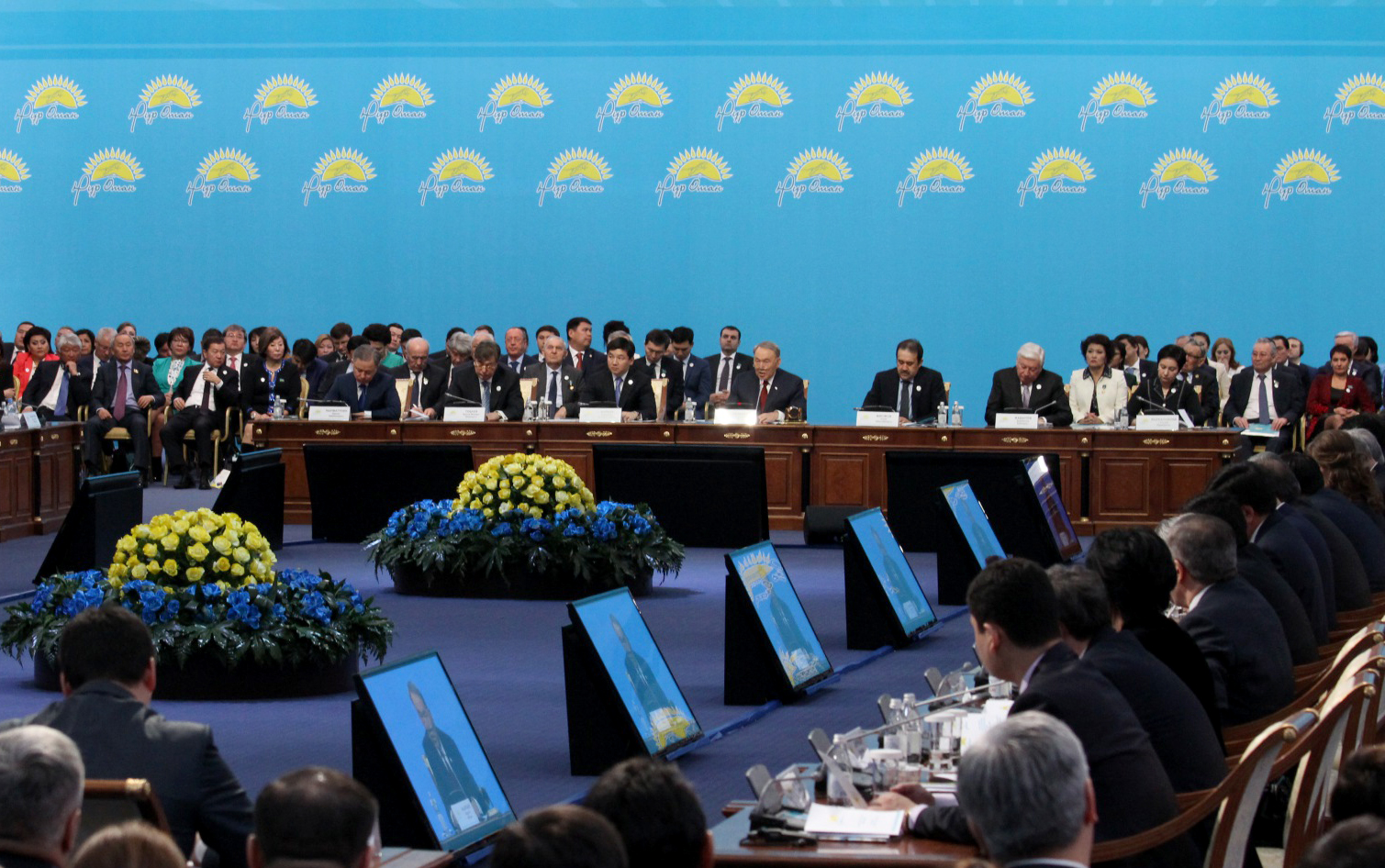ASTANA – Incumbent Kazakh President Nursultan Nazarbayev on March 11 accepted the Nur Otan party’s nomination to be the party’s candidate in the April 26 early presidential election and laid out his policy priorities for another term.
 “Thank you all for your appreciation of my work for the benefit of Kazakhstan and its people. There is no greater reward than to have this confidence of the people. I sincerely thank all those who said that today and addressed kind words to me. I declare my consent to run for the President from the Nur Otan party in the upcoming elections. I urge you, my fellows, Nur Otan party members and Kazakhstan’s people to unite again and win! Our joint moral power and high purpose is Mangelik El – Eternal Motherland! It will fill our development in the 21st century with the energy of progress,” Nazarbayev said. “Building on our successes, we must move forward and that is why I am addressing you here today.”
“Thank you all for your appreciation of my work for the benefit of Kazakhstan and its people. There is no greater reward than to have this confidence of the people. I sincerely thank all those who said that today and addressed kind words to me. I declare my consent to run for the President from the Nur Otan party in the upcoming elections. I urge you, my fellows, Nur Otan party members and Kazakhstan’s people to unite again and win! Our joint moral power and high purpose is Mangelik El – Eternal Motherland! It will fill our development in the 21st century with the energy of progress,” Nazarbayev said. “Building on our successes, we must move forward and that is why I am addressing you here today.”
Nazarbayev was nominated unanimously by the Nur Otan party’s 1,200 congress delegates.
“We must, as a party, nominate Nursultan Nazarbayev and receive his consent. He is the only worthy candidate, and I hereby put forward his candidacy,” prominent academician and Professor Kenzhegali Sagadiyev announced at the congress.
In accepting the nomination, Nazarbayev noted the achievements of independent Kazakhstan and presented new approaches and policies, including those in the new Nurly Zhol economic policy, which is aimed at addressing global challenges.
“Firstly, avoid negative impacts from external factors on state-building. Secondly, maintain the momentum of development. Third, provide the conditions for further development. Fourth, continue advancing toward joining the 30 [most-developed] countries in the world,” he said.
Amid economic crises, falling oil prices and geopolitical instability, Nazarbayev stressed the need for non-standard and strong responses to global challenges to Kazakhstan statehood, putting forward institutional reforms in five key areas: establishing a modern, professional and autonomous state apparatus; solidifying the rule of law; achieving industrialisation and economic growth based on diversification; unifying as a single nation for the future; and functioning as a transparent and accountable government.
He underlined that in conjunction these reforms would strengthen the state and facilitate its entry into the 30 most-developed countries in the world.
“The five institutional reforms are the five steps, which the country should take in that order. Only in this case, our reforms will be effective and the society and the state will be united and stable. All successful states went through this path,” Nazarbayev said.
“It is a way to implement the Kazakhstan 2050 Strategy. Each of the five institutional reforms is a huge challenge and [important] for the country. The success of these reforms can be achieved only with the firm will of the government and the people. The proposed measures will radically change the system of social relations. To carry them out, I propose to establish a National Commission on Modernisation under the President. It will coordinate the implementation of the whole set of reforms. Thus, our central task in the forthcoming years is to start and gradually implement these five institutional reforms,” he added.
Elaborating on the reforms, he underlined the significance of overhauling the civil service, noting that it should be “professional and autonomous” and based on a career model rather than the current positional one. Nazarbayev also highlighted the need to toughen requirements for judges and increase the responsibility of police officers toward the people as it would create conditions for implementing economic reforms to establish a solid middle class.
“The middle class should be considered as the basis of the Kazakhstan nation and the source forming a professional state apparatus. It is the driving force, the most interested in the rule of law, accountability to the people and the country’s stability. Therefore, it is a broad middle class that is the core of the formation of national identity,” he said.
Addressing industrialisation, Nazarbayev underlined existing distortions in the system of state support for agriculture and proposed implementing approximately 10 large-scale projects involving multinational companies in the processing industry.
Other transformations will affect simplification of the tariff policy in the framework of the Eurasian Economic Union, diversification of the economy, development of small- and medium-sized businesses in the service sector and introducing legislation of the special status of Almaty as a regional and international finance centre.
The President also touched upon intercultural and inter-ethnic accord, a highly relevant issue for the country, which includes more than 130 nationalities.
Fourteen Kazakh citizens have filed with the country’s Central Election Commission to seek a nomination since the process began Feb. 26. Nominations will be accepted until March 15.
